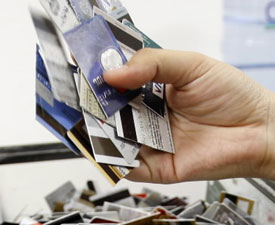Credit card default rates mostly fell in September, but improvements in late payments slowed for most of the major card issuers. American Express, Discover, Chase, Bank of America and Citibank all submitted regulatory filings Friday that said September charge-offs fell to the lowest level this year.
Inside these posts: Credit score
Visit our Filed page for categories. To browse by specific topic, see our Inside page. For a list of companies covered on this site, visit our Companies page.
Discover shares up on news that it beat expectations
Discover Financial Services reported a higher-than-expected quarterly profit on Monday as charge-offs fell and consumers spent more on their credit cards, sending its shares up about 3 percent.
The credit card lender and transaction processing network reported profit of $260.6 million, or 47 cents per share, well above analysts’ average expectations of 38 cents per share. Get the full story »
Study: Lower credit scores in minority communities
Consumers living in minority communities were more likely to have non-prime credit scores, while individuals in mostly-white neighborhoods were more likely to have prime credit scores, according to a report released Tuesday by Woodstock Institute.
The Chicago-based non-profit research group into fair lending issues found that 20.3 percent of Illinois residents had credit scores below 620, a common cutoff point to be considered for prime interest rates. Get the full story »
Perfect 850 credit score an elusive ‘unicorn’?
A major league pitcher dreams of throwing a perfect game. High schoolers eyeing the Ivy League study furiously in hopes of earning 2400 on the SAT. Meanwhile, Chris Peplinski is pursuing his own brand of flawlessness: an 850 credit score.
The 37-year-old stay-at-home dad from Rogers, Ark., has already nabbed 813 on the FICO scale, the credit scoring system most lenders use in sizing up potential borrowers. Get the full story »
American credit scores sinking to new lows
Figures provided by FICO Inc. show that 25.5 percent of American consumers — nearly 43.4 million people — now have a credit score of 599 or below, marking them as poor risks for lenders. It’s unlikely they will be able to get credit cards, auto loans or mortgages under the tighter lending standards banks now use.





